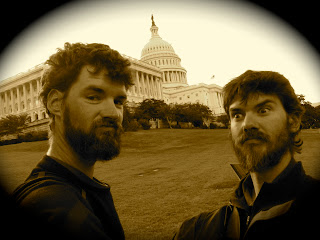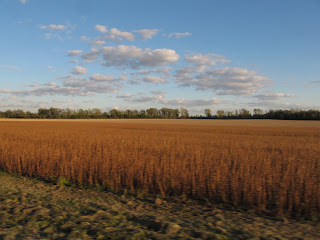Bear with me on this one - it's a little long. Thanks, Neale
As we've crossed the country it's been easy to think of our trip as a story - with its archetypal beginning, middle and end. In the first act we passed through Oregon, Washington, Idaho, Montana, into Wyoming; surmounted our first high climbs along the Columbia gorge, the Bitterroots, and over the Continental Divide; met the young and rough-hewn landscape of the west. After leaving Yellowstone we really seemed to hit our stride; we were waste deep in the trip, crossing the broad and sparse plains of Wyoming and Nebraska; we transitioned into the plain states with the Bighorn Mountains and Black Hills for punctuation; we washed no laundry between Missoula and Lincoln; we met no one we'd known beforehand between Portland and Mahomet, Illinois. The latter slope of this middle arc landed with two easy days of biking between each welcoming home of the friends and family we visited; heartwarming company and days of rest.
The third act begins, I feel, with our turn south from the shore of Lake Erie in Ohio, departing under cold clouds and imminent rain. For several days we struggled ahead through the chill and wet, while the landscape which had flattened in Illinois began to roll again. We were approaching Appalachia, and fall was coming on. In the Celtic year, which begins and ends on Halloween, this is the steady slide towards winter, darkness, death, the dormant seed of new beginnings.
From the southernmost point of Ohio we passed briefly into Kentucky before crossing the Big Sandy River into West Virginia. Here were the rusted bulwarks of industry, the drab rail cars laden with the black dust of coal, the massive hyperbola of a nuclear plant spewing steam. We followed the river up into a steepening and rocky canyon, the water the color of murky antifreeze. Lodging became difficult to find; there were no campgrounds; the motels seemed an afterthought, a strange affectation of the coal mine towns, nearly lost in the shadowed throats of craggy ravines. Blank faces met our searches for places to lie down. We were thankful to have brought enough food into a wasteland of gas station convenience stores.
Poverty evident and unhidden everywhere: the winding highway lined with prefab houses set on shelves carved out of the canyon-side, half of them undermined by rust and rot and abandonment, or burnt to shells. All these meager homes with their signs posted -
private property - no trespassing - this paltry space guarded covetously, and at every fence dogs snarling. We were lucky if there were fences; some dogs lunged within ten feet of us before being snapped back on their chains; others were simply loose and came charging into the road after us, while, hearts pumping, we raced away to avoid a dog's teeth on our ankles or his head in our gears.
A morning in Kermit, WV, comes up slow and gray through the mist. As we bike away from our motel room, two men in coveralls stare at us from a car wrecking yard where they are loading a totaled mini cooper onto a trailer. The hand of one man leaps into the air like a startled bird when I wave at them.
The land is getting more sheer, the ravines more confining, the grades steeper. Are we in Appalachia? Unlike the boarders of states, this region has no signs to say
Now entering . . . This landscape seems illusive even to naming; these canyons reject all but their cliff-view, their cold streams touched by sun only at midday. We ride through the morning stillness of a forest turning to earth by the fall.
Our two-lane highway is punctuated only at times by speeding cars, barking dogs. We begin a climb up a hill, curving around a wall of rock and small tenacious trees. Above us on the hill sits a small mobile home tacked to the cliff with a short steep drive dropping to the road. As we pass, a raucous alarm goes up from the unseen dogs there, and pounding down the drive, muscles lithe under rippling hide, comes a stub-nosed dog, with a throaty growl that hums in my bones. My legs are already pumping; he is plummeting right for me. A burst of speed puts me just ahead of his trajectory, but I can hear him: his growl as thick as meat, his huffing breath, his nails on the road; he must be right at my rear wheel. I push up the hill faster, legs churning, coming alongside Dave who looks at me startled.
Then around the curve flies a gray SUV, a flash of metal, a single frame in a film; I hear the wet crack of chrome, like a tree snapping in high wind, like a glacier calving, like all sounds we know to mean a stringent severance, and I look back to see the dog laid out and spinning along the road like a plate on ice. His ears raised in the wind of his death-turn as though startled or listening. I look ahead not to crash, and I am around the curve, and then I am stopping because I can't see; I am weeping. I am weeping in that way that there is nothing else one can do. Dave comes and helps me move off my bike and across the guard rail; I am still curled over with this sudden weight. All along this road, all across the continent, we've seen and smelled and felt the death of animals on the highway, their carcasses newly killed or decaying, and though we've had some small part in it, our responsibility seemed minute. Yet here we are in this dank canyon and have seen it happen right before us, and more, have been the cause of it. No blame but a simple fact: if we had not been there the dog would be alive.
After a while we compose ourselves and ride on; there is nothing else to do. The mist seems laden with weighted feeling, this darkening season. Soon we are both ravenous, as if something in our guts is screaming for us to live. My mood swings into a crazed euphoria. The yellow leaves and bark of trees, the smell of wet stone and loam, everything is crisp and vibrant. I want to call everyone I know and cry into the phone
Danger! Danger! Danger! Not to instill fear, but to remind us all of the danger that lives like a slick on our skin. We are never free from it; life would not be without it; and it's as if the awareness of this close danger makes everything I see, every moment important, imbued with drinkable detail and experience.
We passed on out of those close mountains of West Virginia into the broader valleys and craggy ridges of Virginia and North Carolina. I was glad to be out from those cold ravines, into the landscape most often associated with Appalachia, in all its brilliant colors of fall. I carried something with me there though, that came from the death of a dog on a highway in a dark ravine, a lesson which I feel has been reiterated across this trip, what Robinson Jeffers called "experience and ecstasy," being engaged with living, its spectrum of pleasure and discomfort, especially because it can end soon.
We're now staying with family near Asheville, in what might be called the denouement of this story, but up there on the crest of the Appalachians, camped beside the Blue Ridge Parkway in a thunderstorm, lightning cracked directly above us, shook our bones and blinded us, and curled in our tent we kept our eyes open, to look into the darkness before our sight returned.
-Neale














































